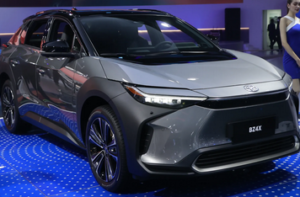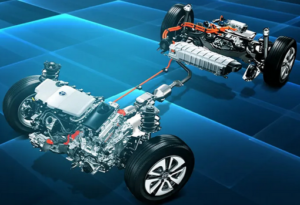Toyota’s Groundbreaking Solid-State Battery: A Quantum Leap for Electric Vehicles and Renewable Energy
In a groundbreaking announcement that has sent ripples through the automotive industry, Toyota has unveiled a revolutionary solid-state battery technology, heralding a new era for electric vehicles (EVs) and renewable energy. With a staggering range of 750 miles on a single charge, this technological marvel not only shatters the limitations that have hindered widespread EV adoption but also opens doors to a cleaner, more sustainable future. In this blog post, we’ll delve into the implications of Toyota’s latest innovation, exploring how it could reshape the automotive landscape and accelerate our journey towards a fossil fuel-independent world.
The Solid-State Breakthrough:
Toyota’s solid-state battery is a game-changer, representing a quantum leap in energy storage technology. Unlike traditional lithium-ion batteries, which use liquid electrolytes, solid-state batteries employ solid conductive materials. This not only enhances their energy density but also addresses safety concerns associated with liquid electrolytes.
- Extended Range: The most awe-inspiring aspect of Toyota’s solid-state battery is its remarkable range of 750 miles on a single charge. This achievement effectively eliminates the range anxiety that has been a significant deterrent for potential EV buyers. Imagine driving from city to city without worrying about constantly seeking charging stations – this is the promise of Toyota’s innovation.
- Commercialization Timeline: While the announcement has sparked excitement among EV enthusiasts, the commercialization of this technology is projected to take 3-4 years. This timeline accounts for the rigorous testing, optimization, and scaling processes required to ensure the technology meets safety and performance standards for mass-market adoption.
- Top-Down Implementation: Industry experts anticipate that this revolutionary battery technology will initially be implemented in the top-tier EV segment before gradually trickling down to mid-range and more affordable options. This top-down approach ensures that early adopters in the luxury EV market can experience the benefits before the technology becomes universally accessible.
Implications for Electric Vehicles:
The implications of Toyota’s solid-state battery for electric vehicles are monumental. Let’s explore how this breakthrough could reshape the EV landscape.
- Overcoming Range Limitations: The primary hurdle for EV adoption has been the limited range compared to traditional internal combustion engine vehicles. With a 750-mile(1200 kms)

Toyota EV range, Toyota’s solid-state battery not only eliminates this limitation but exceeds the range of many gasoline-powered cars. This could be a pivotal factor in encouraging consumers to make the switch to electric vehicles.
- Mass Adoption Potential: As the technology matures and becomes more cost-effective, it has the potential to make EVs more accessible to a broader demographic. The elimination of range anxiety and the convenience of longer trips without frequent charging stops could drive mass adoption, reshaping the automotive market landscape.
- Environmental Impact: The widespread adoption of EVs powered by solid-state batteries would significantly reduce carbon emissions and air pollution. With transportation being a major contributor to environmental degradation, this shift could mark a turning point in the fight against climate change.
Renewable Energy Synergy:

Beyond its implications for electric vehicles, Toyota’s solid-state battery could catalyze a revolution in renewable energy integration.
- Increased Reliability: The reliability and efficiency of solid-state batteries make them ideal for storing energy generated from renewable sources such as solar and wind. This addresses the intermittent nature of renewable energy production, contributing to a more stable and reliable power grid.
- Energy Storage for Homes and Businesses: The compact and high-capacity nature of solid-state batteries makes them suitable for residential and commercial energy storage solutions. This could empower individuals and businesses to harness and store renewable energy, reducing dependence on traditional power sources.
- Grid Decentralization: The widespread adoption of solid-state batteries could contribute to decentralizing energy grids. Localized energy production and storage, coupled with EVs acting as mobile energy storage units, could create a more resilient and adaptable energy infrastructure.
Conclusion:
Toyota’s announcement of a solid-state battery with a 750-mile(1200 kms) range is a watershed moment in the journey towards a sustainable, fossil fuel-independent future. While the technology is poised to transform the electric vehicle landscape, its broader implications extend to reshaping how we harness and store energy from renewable sources. As we eagerly anticipate the commercialization of this groundbreaking technology, it’s clear that Toyota’s innovation is not just a leap for the automotive industry but a giant stride towards a cleaner, greener, and more resilient planet. The road to a sustainable future just got a lot clearer, and the destination is within reach.
Pingback: Electric Vehicle - Versatile Day